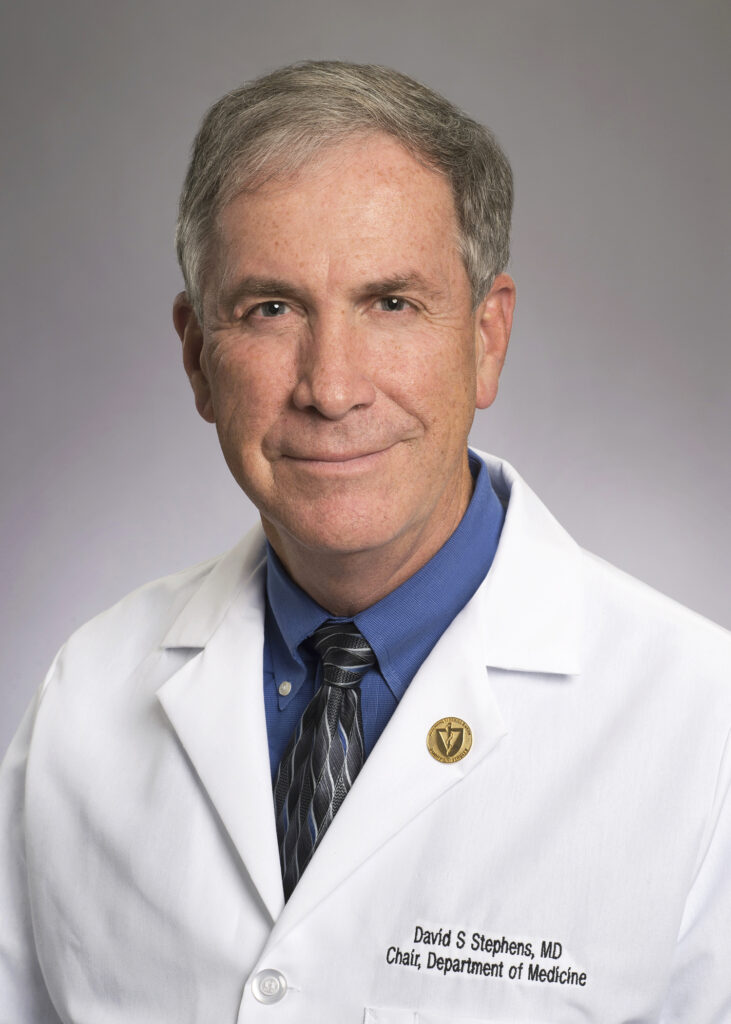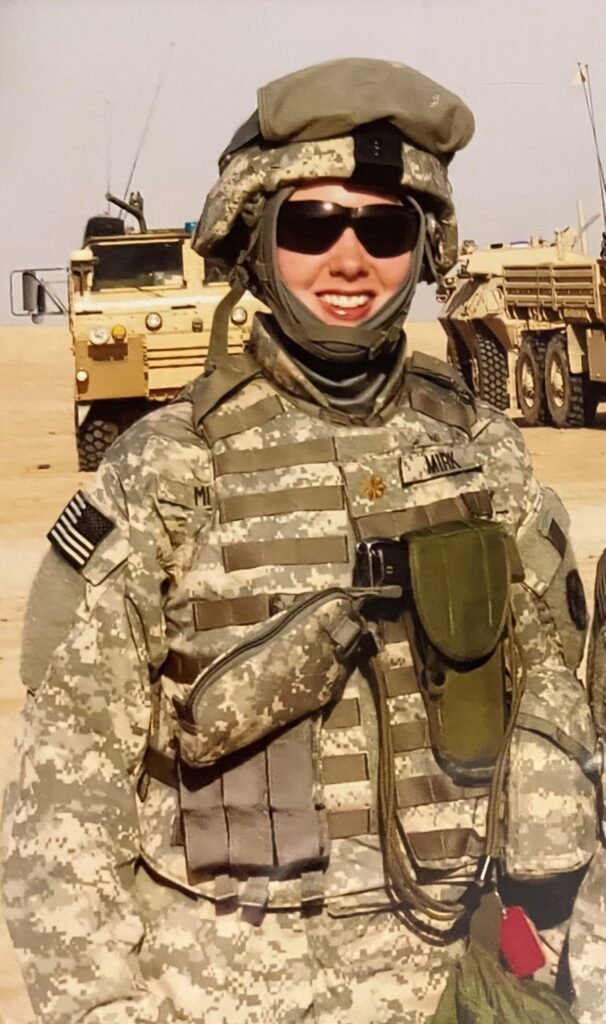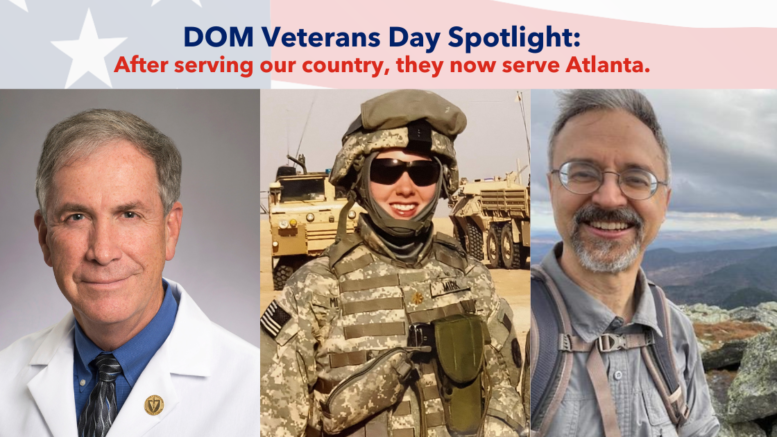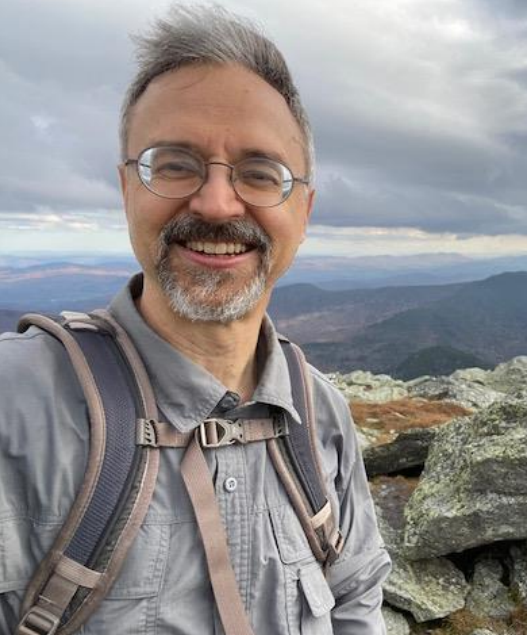Saturday, November 11, is Veterans Day, a day to honor military veterans of the United States Armed Forces. We would not only like to recognize those who served our country but specifically Veterans who now work for the Department of Medicine, serving Atlanta and local Veterans at the Atlanta VA Medical Center. We are pleased to spotlight our Chair, David Stephens, MD, and faculty members Anna Mirk, MD, and Michael Saenger, MD, in recognition of this day. Read more below.
 DAVID STEPHENS, MD, Chair, Department of Medicine, Vice President for Research, Woodruff Health Sciences Center
DAVID STEPHENS, MD, Chair, Department of Medicine, Vice President for Research, Woodruff Health Sciences Center
Please share your branch, rank, and years of service.
U.S. Army, Lieutenant then Captain, U.S. Army Medical Corps, 1968 Active-Duty training, 1970 -1975 U.S. Army Reserves, and 1975–1977 Active Duty.
How did you decide to join the military?
ROTC commitment.
How do you think being in the military prepared you for a career in medicine?
Leadership and challenging experiences.
How did your years of service relate to serving those in medicine?
From 1975–1977, I oversaw the medical care of a military and Native American population in central (Ft. Greely) Alaska. (A real-life “Northern Exposure”).
What did you find rewarding about working at the VA?
Providing needed care to the underserved Veteran population. The VA also provided a path for early career development.
What Does Veterans Day mean to you?
Honor those who have served and sacrificed. I have a long history of military service in my family. I also lost college and high school classmates in the Vietnam War.
 ANNA MIRK, MD, Associate Professor of Medicine, Division of Geriatrics and Gerontology
ANNA MIRK, MD, Associate Professor of Medicine, Division of Geriatrics and Gerontology
Tell us about yourself.
I am a board-certified internist and geriatrician and currently serve as the program director for the Emory Fellowship in Geriatric Medicine and as the Associate Director for Education for the Division of Geriatrics and Gerontology. My clinical practice is at the Atlanta VA, where I serve as the Associate Director for Clinical Innovation for the Birmingham/Atlanta GRECC (Geriatric Research, Education and Clinical Center), one of 20 VA centers of excellence in aging across the nation.
Please share your branch, rank, and years of service.
I served on Active Duty in the United States Army Medical Corps from 2000–2008 and in the US Army Reserve from 1996–2000. My rank was Major at the time I left the Army in 2008.
How did you decide to join the military?
When I was an undergraduate and exploring how to pay for medical school, I found out about the Army Health Professions Scholarship Program (HPSP), which pays full tuition, books, and fees for those pursuing a career in the fields of medicine, dentistry, veterinary, nursing, clinical psychology and optometry. You become a commissioned officer in the Army and serve at least eight years of active duty. Many of my family members, including my father, grandfather, and several aunts and uncles, had served in the military, and I knew that military service was a source of pride and honor. Serving my country through the Army Medical Corps was a win-win decision for me.
How do you think being in the military prepared you for a career in medicine?
While people may associate Veterans with negative aspects of military service, such as PTSD, military service can instill and support strong values and leadership skills, such as selfless service, dependability, discipline, resiliency, and teamwork. As part of my active duty service, I completed my internal medicine residency training and geriatric medicine fellowship at Army Medical Centers, where I not only received exceptional medical training but simultaneously learned my role as an Army Officer. Medical residency is a tough time for nearly everyone, but I feel that serving in the Army during this time enhanced my sense of belonging, duty, and self-awareness.
How did your years of service relate to serving those in medicine?
During my Army career, I served as both a physician and an officer. Both positions require service before self. The culture of servant leadership translates easily to medicine, where responsibility for the well-being of my patients and my team is front and center. I also learned that it takes a highly functional team to complete a mission successfully, and this is no different in medicine, especially in geriatrics. The knowledge, skills, and input from the whole team—with the focus on the individual patient—are essential to coordinated and holistic care.
What do you find rewarding about working at the VA?
Much of my fellowship training in geriatrics took place in the VA healthcare system. I knew this was a population I felt drawn to serve. As a Veteran myself, I feel I have an additional layer of understanding of military culture and respect for what military service entails. With about 50% of the U.S. Veteran population aged over 65, practicing geriatrics in the VA is very rewarding. I am able to work in a system with interdisciplinary coordinated care and innovative models of care delivery for our older Veterans. The VA is a leader in research and clinical care for older adults, and this allows me to work among some of the most dedicated scientists and clinicians in my field to advance the care of our nation’s Veterans.
What Does Veterans Day mean to you?
The original “Armistice Day”—remembering the eleventh hour of the eleventh day of the eleventh month in 1918, when hostilities ended in the First World War, has transformed over the years, as WWI was sadly not “the war to end all wars.” I think of the day as a time to thank and honor all those who have served and are still serving our country, a day to be thankful for our freedoms.
MICHAEL SAENGER, MD, VA National Program Director, TelePain-EVP Empower, Veterans Program
Tell us about yourself.
My main role is VA’s National Program Director for TelePain-EVP Empower Veterans Program—training Veterans affected by high-impact chronic pain in their homes to confidently use new skills and perspectives to have less pain and more living.
Please share your branch, rank, and years of service.
Active Reserves, USAF (Air Force), 1987-1996; leaving as Major.
How did you decide to join the military? The sense of duty for and honor in public service and giving back interested me—also, the way to pay for future public service after college and medical school training.
How do you think being in the military prepared you for a career in medicine?
- Exposure to many different people
- The military led in anti-racism—there are still ways to go, but they are way ahead of the general U.S.
- I was stationed in Japan, where I was able to experience new perspectives.
- I learned traditions of leadership and service to others.
- The commitment to a joint mission and not being protective of “trade secrets. I was a general internist providing access to specialized medical care to outpatient and inpatient services run by Family Practice MDs in northern Japan; I could supplement my experience by calling someone in USAF who was a specialist AND awake at the time of my call from Japan.
How did your years of service relate to serving those in medicine?
- Learning Evidence-Based Medicine and training others, starting with training primary care providers in the diagnosis of and effective care of major depression (back in the early 1990s); this spread to starting depression/anxiety treatment within Emory supported clinic within Grady’s Primary Care Clinics.
- Overseeing Gulf Coast’s evaluation of active duty troops with Gulf War Syndrome, which was a multisymptom disorder of unclear etiology experience, led me to appreciate VA’s approach to uncertainty and to still take the person seriously, honor them, and give them the best possible care to assist them in recovery and their wellbeing (clinical practice guideline for chronic multisystem illness). That led to our interdisciplinary team of providers coaching Veterans with high-impact chronic pain from a bio-psycho-social-existential perspective (not just medications and procedures, as we are more than a machine or a missing molecule).
- Understanding how to take a military history (Military Health History Pocket Card). It is important for providers to gain insight into how to respect Veterans and learn about how their military experience may have affected their current health or illness. Of the 20 million Veterans, only 6–9 million (typically some of the most affected) are actively seen in VA care.
What do you find rewarding about working at the VA? Serving those who served us and were willing to give up their lives for others. As well as the cutting-edge interdisciplinary care, health system redesign with “what matters to you?” as more important than “what’s the matter?”, (our typical first question in medicine.)
What Does Veterans Day mean to you?
Honoring those who choose to serve others and choose to give up personal freedoms during service, even if it didn’t mean giving up your physical life.
Emory’s support for veterans
In addition to the Emory Healthcare and School of Nursing programs, there are other initiatives for veterans across campus. The Campus Life Veterans Committee is currently asking students to update their veteran status in OPUS so the university can have a more accurate count of veterans on campus.
Through the Yellow Ribbon program, Emory provides funding to help post-9/11 veterans pay for educational expenses beyond what is covered by the G.I. Bill.
The Emory Law Volunteer Clinic for Veterans provides pro bono legal services for veterans, assisting them and their families with legal issues, including disability claims, before the Veterans Administration and subsequent appellate proceedings, estate work, and discharge upgrades before the Department of Defense.
For more information on how Emory supports veterans, visit the admissions page.



Be the first to comment on "Emory Department of Medicine shines a spotlight on our department’s Veterans and how they serve Atlanta."